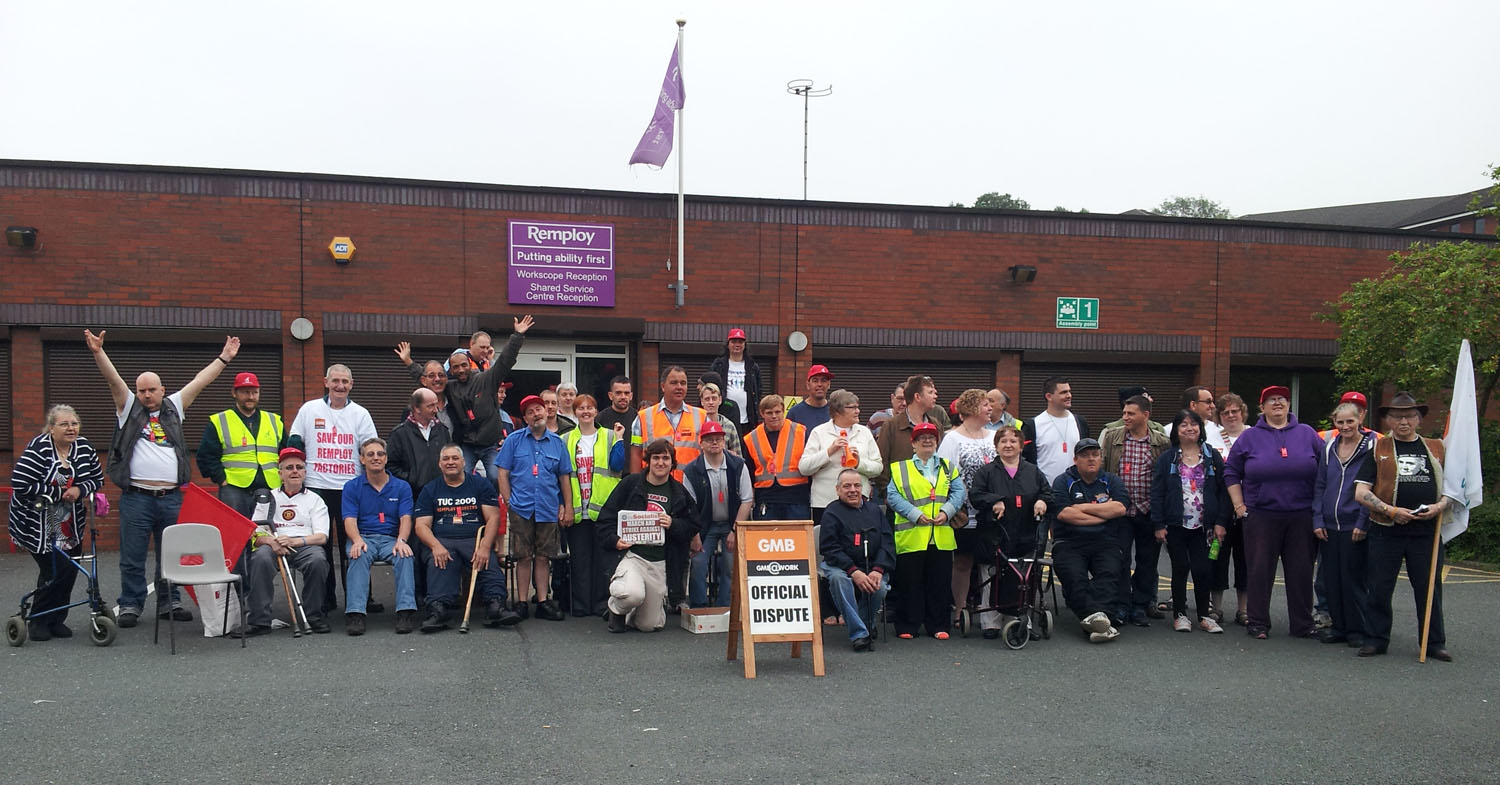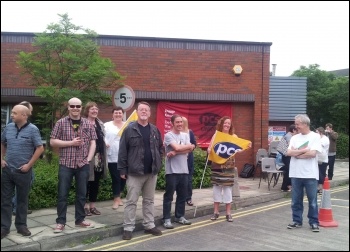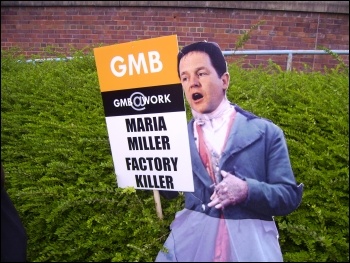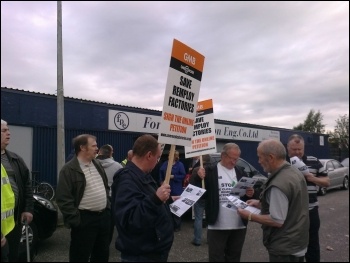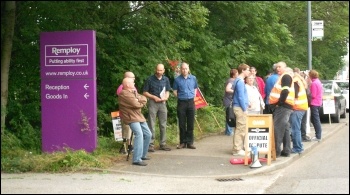Leeds
The second day of strike action at the Leeds Remploy factory saw large numbers of pickets once again.
A delegation from the PCS DWP group executive came down early on to support the strike as did members of other local trade unions.
The pickets’ anger showed with chants of ‘Maria Miller Factory Killer’ directed at the government minister directing the closures of the factories.
Peter Williams who has worked here for 33 years said: “The government are doing it all wrong, David Cameron has gone back on his word.
“Before they came into power he said that he would help disabled people and elderly people.”
John Buttress who has worked at Remploy for 36 years added: “He says we can all get jobs, but my two young able-bodied sons who are 18 and 23 can’t get jobs”.
While a small picket was left on the factory, most of the pickets went to a 100-strong lunchtime rally in Victoria Gardens with delegations from PCS, Unison, CWU, Unite, NASUWT as well as other members of local GMB branches.
Speakers giving support and solidarity to the workers on strike included PCS union DWP president Fran Heathcote, Leeds TUC president Sheila Banks, GMB regional secretary Tim Roache and myself on behalf of the Socialist Party.
Despite the presence of Leeds West MP Rachel Reeves, who also spoke at the rally, one GMB member spoke specifically to highlight the fact that Labour oversaw the closure of 29 Remploy factories in 2008 and demanded that if Labour wanted to really show their support for Remploy workers they should commit themselves to re-opening all closed Remploy factories.
That there is some frustration at the role of the Labour Party, which GMB is affiliated to, should come as no suprise given that 25% of the motions to the recent GMB conference criticised this very link.
The idea of a new workers’ party and support for TUSC (Trade Unionist and Socialist Coalition) has received a warm reception amongst pickets, as did the NSSN’s upcoming lobby of the TUC on 9th September calling for a general strike against the government’s austerity attacks.
Further strike action is planned for 6th August.
Iain Dalton
Birkenhead
30 workers were present on the picket line in Birkenhead in the second of two 24-hour protests against the scheduled closure of Remploy factories across Britain.
The government plan will force about 1,700 disabled workers out of work. This announcement by the government is at a time when unemployment is at its highest since 1992 with the Birkenhead area being one of the worst hit.
Jeanette Williams, the Unite shop steward, stated that the Remploy factories were created “to help those who had been heavily injured in World War II, but we are in a war now. How are we going to help those who are coming back from the Middle East and ease them back within society if this corrupt government is closing these sites down?”
She then told me a story about an autistic man who had come to Remploy through his school and who struggled to communicate with other people.
Yet, through Remploy he gained the confidence and skills to gain further employment. This is in stark contrast to the assessment made by the secretary of state, Iain Duncan Smith, who claimed that the workers ‘don’t do any work.., simply making coffee.’
Gareth Rees , GMB’s shop steward, added: “The government are going after those who can’t defend themselves.
The last time they closed factories most of the workers didn’t find work again (95% of those axed in 2008 by Labour are still unemployed). I’ve got Cystic Fibrosis, who is going to employ me?”.
Cameron Dunleavy, Liverpool & District Socialist Party
Newcastle and Gateshead
Striking Remploy workers from both Gateshead and Newcastle gave us a warm welcome as we arrived on their picket lines armed with our Socialist Party strike bulletin.
In Gateshead, van and lorry drivers pulled up to speak to and support the strikers. One of them commented that “we must fight back”.
Then he paraphrased Pastor Niemoller’s poem, First They Came for the Jews, he said that if we don’t fight, “Then they will come for me and there’ll be nobody left to fight.”
Colin Hogget, factory team leader and senior Unite factory rep, commented: “The public around here have been absolutely fantastic.
We’ve had support from various local factories. Everyone seems to agree that what this government is doing is scandalous. The only people who can’t see this is the government itself.”
Colin went on to say: “If they can do this to disabled people who is next on Cameron’s hit list. The British public need to fight now – before it is too late.”
In Newcastle the strikers poured over our strike bulletin. Andrew Chisholm, who has worked at Remploy for 33 years, told us the difficulties he would have finding another job.
Standing close by, David Madden joked: “I’ve only been here for 22 years.” He went on to say that he loved his job at Remploy and in those 22 years he has never had a day’s sick leave, and he’s a good time keeper.
All the Remploy workers recognise the problem they will have finding alternative work if they do not win the battle against these factory closures.
John Harris, Remploy team leader and GMB member, commented: “Everyone is united, everyone has turned out on the picket line.”
John also set out his frustration that the government has not been prepared to discuss the alternative strategy put forward by the unions.
Many Remploy workers expressed the necessity to keep fighting in order to keep Remploy for future generations.
Ronnie Maddox told us: “I’m blind in one eye and I lost nearly nine years of schooling. What chance do I and others here have against fit people with college degrees who are also struggling to find work.”
As we were leaving, Brian Guthrie expressed the fear many of the Remploy workers are facing if they are thrown out of work. “The banks aren’t going to be lenient.
“Council tax, gas and electric bills will have to be paid. We’re worried about keeping the wolves at bay.”
At both Newcastle and Gateshead picket lines we also received an excellent response regarding the National Shop Stewards Network call for a 24-hour general strike.
Elaine Brunskill
Bristol
Once again the strike at Remploy in Bristol was 100% solid with all the workers out and most on the picket line.
The sun was shining and the pickets were in a good mood but there was no dent in their determination to fight the attacks on Remploy.
The people we spoke to wanted to talk about politics and clearly saw their struggle in the context of the economic crisis, high unemployment and the cuts.
There was support for linking up with other workers under attack and for the National Shop Stewards Network lobby of the TUC on 9th September, which is calling for a one-day general strike against austerity.
I spoke to Mark Cambridge, a Unite member in Remploy and asked him why he was out:
“We’re on strike to speak up and stand up for our rights. In Remploy Bristol in particular we are concerned about the effects of possibly being TUPE’d over to a private company and our years of service not being recognised.
Basically we’re standing up for our futures and for future generations of disabled people. We’re showing we’re no longer the little people who can be easily rolled over. We must fight to get the support we need, especially in this economic crisis.”
I also asked him what he thought the next step was for Remploy workers:
“We need to coordinate with other groups of workers and raise national awareness. There are still a lot of people that don’t know what Remploy is or what’s being done to us.
“That’s our key aim. We want to build support and be in a stronger position to take on the government when parliament meets again in six weeks.”
Tom Baldwin
Glasgow, Springburn
Another large turnout gathered on the picket line at Springburn. Phil Brannan, shop steward at the plant for 32 years, told us he had been involved in talks with the DWP, Remploy and a representative of the Scottish parliament.
He said that the DWP is solely intent on reducing any future redundancy payments to the lowest level possible.
Further talks will take place on 2nd August and, if there is no satisfactory outcome, a further strike will take place on 6th August.
A lobby of the Scottish parliament is planned for 18th August to coincide with a visit from Marie Miller, the government minister for disabled people.
When the picket was well established the manager of the plant, which produces steel wheelchairs , arrived in his BMW to open the gates.
To the astonishment of all, he discovered that the padlock had been super-glued. He quickly exited the scene claiming he would be returning with the police. As yet there is no sign of a return.
Wishaw, North Lanarkshire
Another healthy picket line at the factory which presently packages Simon Schuster books on contract to Harper Collins.
It once employed over 50 workers. This was reduced to 33 with the first set of redundancies and there recently followed a further reduction with vouluntary redundancies, now leaving a workforce of 22.
The plant is set to close on 30th September. However, it is estimated that the workforce will be asked to leave two or three weeks before, leaving five more weeks of work to go.
David Walker (57) and Jim Rooney (51) vented their anger at government policy. David, with learning difficulties, has worked at the plant since he left school and is at a loss as to what his future might hold.
Jim, who suffers from diabetes argues that Remploy is not a factory building, it is a group of people who are losing their jobs and shouldn’t be.
Ray Gunnion and Diane Harvey
Chesterfield
All union members were out on strike again at Chesterfield and the majority took part in the picketing. All were angry at the way Remploy has been run down – under both Labour and Con-Dem governments.
Since 1995 the number of Remploy workers has fallen by nearly three-quarters while the number of managers has doubled! And the pay gap between the average shop-floor worker and average manager has doubled too.
Public money has been handed over to private companies taking work from Remploy. “It shouldn’t be allowed,” was the view of many.
There was support for the announcement of another national strike day on 6th August, but several felt that more action was needed – a national strike of at least a week.
The idea of the TUC calling a one-day general strike was also supported. The National Shop Stewards Network leaflet for the lobby of the TUC on 9th September was well received.
With closure of many of the factories just weeks away, and Chesterfield probably not far behind after its likely handover to businessman Simon Webster, Socialist Party members raised the idea of factory occupations to step up the fight to save the factories and jobs.
Jon Dale
Reports from Wales, see:
http://www.socialistpartywales.org.uk/home.shtml
East London
About 50 Remploy workers and supporters took part in a lively picket of the Barking Remploy plant in east London on Thursday 26th July.
Socialist Party strike bulletin leaflets were enthusiastically received by the workers. To the background of regular toots of support from passing drivers, the chant went up: “Maria Miller, factory killer”.
Workers are angry at the threatened closure of the plant and are determined to do what they can to keep it open.
The Barking factory is due to close in three weeks time. Several workers explained how this factory was more than just a workplace and that they felt that fellow workers were their family.
Workers are also extremely angry at the low level of redundancy pay. One worker who has been working at the factory for over 10 years explained that this is the first time she will have been unemployed in her working life.
Whilst a number of Labour councillors supported the picket, several of the pickets were clear that the previous Labour government had begun the closures.
They were sympathetic to the Trade Unionist and Socialist Coalition (TUSC). The National Shop Stewards Network leaflets advertising the lobby of the TUC on 9th September went down well with several on the picket definitely committing themselves to coming.


